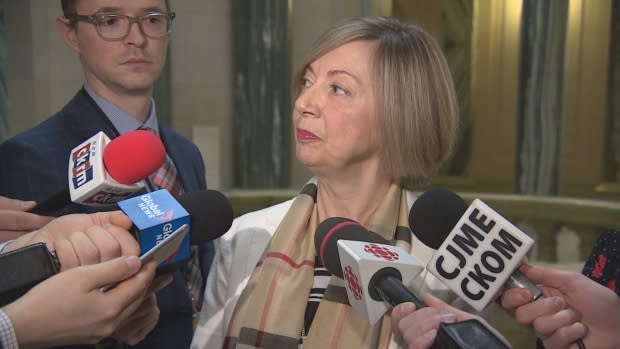Sask. Ombudman says 'brown envelopes' suggest public servants fear whistle-blowing reprisal
Whistleblower concerns and an attempt by a Saskatchewan Health Authority (SHA) facility to make a blind resident pay for cable TV are among the issues outlined in this year's annual report by Saskatchewan's ombudsman Mary McFadyen.
McFadyen, who is also the Public Interest Disclosure Commissioner, flagged what she described as a troublingly low number of complaints by public sector workers about their employers.
"It would be nice to think that these numbers are very low because there has been very little wrongdoing going on in Saskatchewan government institutions, but with thousands of employees across a broad system, we would expect to hear from more people," said McFadyen.
Last year she received 3,124 ombudsman complaints from the public about provincial and municipal entities.
She was only contacted six times as the Public Interest Disclosure Commissioner during the same period.
Under the Public Interest Disclosure Act, employees of certain provincial government institutions are protected if they disclose possible workplace wrongdoings to the Commissioner or a designated officer. McFadyen has received a total of 77 inquiries in that capacity since 2012. Designated officers have received only six over the same period.
McFadyen said employees might not feel safe coming forward or might think their concerns don't meet the definition of wrongdoing under the Act, but added that all disclosures count.
'Brown envelopes'
She said part of the reason she does not believe the numbers add up is because her office is receiving "brown envelopes" from people who want to remain anonymous.
McFadyen said those envelopes suggest there is fear of reporting, adding that she believes the province needs to improve its communication to workers about how whistleblowers are protected.

NDP Opposition Leader Ryan Meili said he has personally heard from people who say they cannot speak out against the government's actions.
"The general sentiment among the public is, especially anyone whose organization is dependant on funding, or who works for the government, is that if they speak up they will be punished," said Meili.
Workplace Safety Minister Don Morgan told reporters at the legislature on Thursday that the province is doing its best to reduce problems with bad practice.
"We're not seeing people go to the media or go to the Opposition," said Morgan.
"So, we're hoping that there aren't people out there that aren't afraid to come forward, we've tried to be open and accessible as much as we can."
Blind man unable to opt out of cable TV
McFadyen's Ombudsman report, released Thursday, also details case studies from the previous year of complaints.
One of the cases involved a long-term care facility that tried to charge a blind man for a monthly cable bill.
The facility had managed to secure a significant discount from a cable company, but it was dependant on a certain number of people using it.
According to the ombudsman's report, the facility's managers said it was for the greater good of all the residents and that the man listened to the TV.
"We found that the facility didn't have a policy about the cable rate or an appeal mechanism for those who wanted to opt out," said the annual report.
The health authority agreed to allow the man to opt-out of the cable deal after the ombudsman became involved.
Complaints by ministry
Of the total number of ombudsman complaints in 2018, 874 were about social services. The number was lower than the 906 in 2017 but higher than 869 received in 2016.
The number of complaints about provincial corrections and policing services went down to 767 in 2018 from 845 in 2017. There were 932 complaints in 2016.
Municipalities attracted fewer complaints in 2018 with 452 overall. There were 572 in 2017 and 506 in 2016. Rural municipalities received the highest number of complaints with 145, but that number was lower than the 209 in 2017.
The number of complaints about the health ministry increased by two to 173 in 2018 from 171 in 2017. There were 278 such complaints in 2016.
Crown corporations received a combined total of 452 complaints, with SGI making up the highest number of those with 204. The total number of complaints about Crown Corporations was 387 in 2017 and 401 in 2016.
Other ministries and entities made up 406 of the total number of complaints, compared with 417 in 2017 and 433 in 2016.
The full reports are available by visiting the websites for the Ombudsman and the Public Interest Disclosure Commissioner.

